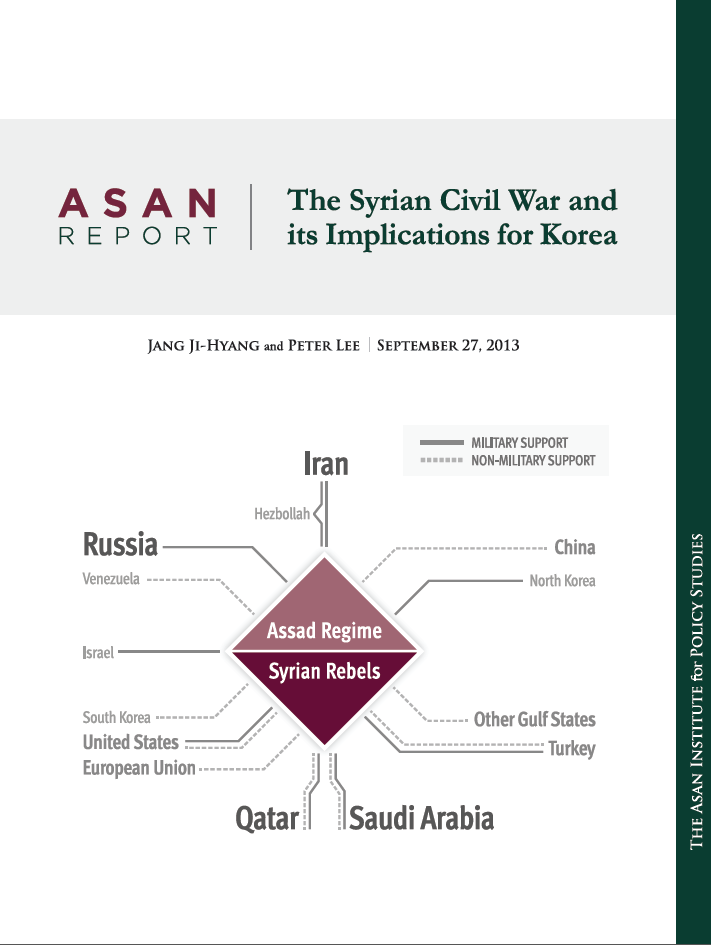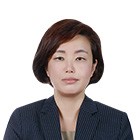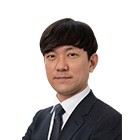Video
Publications
Reports
Publications | Reports
The Syrian Civil War and Its Implications for Korea
Jang Ji-Hyang, Peter K. Lee
7,7382013.09.26

Jang Ji-Hyang and Peter Lee,
"The Syrian Civil War and Its Implications for Korea"
This report discusses the causes behind the protracted nature of Syria's civil war, how a decisive outcome can be reached, and what South Korea can do to aid such a resolution. It concludes with an analysis of the implications for the Korean Peninsula and offers policy recommendations for what role South Korea should be playing.
Executive Summary
This report discusses the causes behind the protracted nature of Syria’s civil war, how a decisive outcome can be reached, and what South Korea can do to aid such a resolution. It concludes with an analysis of the implications for the Korean Peninsula and offers policy recommendations for what role South Korea should be playing.
Key Causal Factors
This report contends that there are two factors explaining the Syrian civil war. First, the security establishment and the urban elites have been slow to abandon the hereditary dictatorship of Bashar al-Assad out of fear that the ensuing uncertainty will be worse than the status quo. Second, while Iran, Russia, and China have continued to steadfastly support the regime, the international anti-Assad coalition’s competing goals have led to sporadic and incoherent support for the rebel opposition mainly composed of low-ranking conscripts, civilians, and foreign fighters.
International Policy Recommendations
The current strategy of calling for Assad to step down while cautiously arming the rebels has been ineffective. First, a concerted effort is required to remove key elements of Assad’s security apparatus from the current balance of forces by encouraging their defection and providing more aggressive and direct incentives rather than negotiating with the regime’s leadership. Breaking up the cohesiveness of the core military elites and triggering an internal coup will be the key to finishing the civil war. Second, there needs to be agreement between Turkey, Saudi Arabia, and Qatar—the rebel’s major supporters—with the United States and European Union on more direct and coordinated military funding and intervention. These countries must also be prepared to offer concessions to Iran, Russia, and China to secure their reluctant acquiescence for Assad’s departure, such as assuring them that a pro-Western, radical Sunni regime will not take over.
South Korean Policy Recommendations
Syria is a test of whether the international community can work together to end civil wars in the face of entrenched resistance, domestically and internationally. As an internationally active middle power, South Korea should continue to use its position at the United Nations Security Council to call upon the Assad regime to respect the rights of civilians. It should significantly increase its aid contribution for Syrian refugees, which is currently only $5 million. It should also offer greater humanitarian assistance for the more than 2 million refugees residing in neighboring Turkey, Jordan, Lebanon, and Iraq, where its political and economic interests are quite strong.
Lessons for the Korean Peninsula
Finally, there are
important lessons South Korea can learn from the Syrian civil war vis-à-vis
North Korea. If North Korea were to experience a sudden, popular uprising that
eventually led to civil war, the twin variables of internal cohesion and
external division may similarly hold true. After all, both Syria and North
Korea are resilient, dynastic hereditary succession regimes dependent on the
backing of China, Russia, and Iran. In the event of a North Korean civil war,
we may witness the similar kind of regime survival and international stalemate
that has prevailed in Syria. Therefore, South Korea and the international
community should focus on two goals: the defection of key military elites and
incentivizing China to abandon Kim Jong-un.
First, it will be crucial to focus exclusively on key units in the security establishment strategically located in urban areas, such as the Pyongyang Defense Command and the Guard Command, and facilitate the defection of high-ranking officers by providing amnesties, financial incentives, and evacuation plans. Second, it will be decisive to provide incentives to China, Russia, and Iran to give up their support for Kim Jong-un as the leader of North Korea. The threat of regional economic collapse could incentivize China, in particular, to quickly seek an end to hostilities. While the Syrian civil war has not destroyed the economies and oil production of the region, a prolonged crisis in North Korea will have a devastating effect on China’s economy.

Jang Ji-Hyang
Principal Fellow, Director
Dr. JANG Ji-Hyang is a Principal Fellow and director of the Center for Regional Studies at the Asan Institute for Policy Studies. Dr. Jang served as a policy advisor on Middle East issues to South Korea’s Ministry of Foreign Affairs (2012-2018) and currently serves to Ministries of Industry, Justice, and Defense. Her research interests include political economy of the Middle East and North Africa, political Islam, comparative democratization, terrorism, and state-building. Dr. Jang is the author of numerous books and articles, including The Essential Guide to the Middle East (Sigongsa 2023 in Korean), The Arab Spring: Will It Lead to Democratic Transitions?(with Clement M. Henry (eds.), Palgrave Macmillan 2013), “Disaggregated ISIS and the New Normal of Terrorism” (Asan Issue Brief 2016), “Islamic Fundamentalism” (International Encyclopedia of the Social Sciences 2008) and a Korean translation of Fawaz Gerges’ Journey of the Jihadist: Inside Muslim Militancy (Asan Institute 2011). Dr. Jang received a B.A. in Turkish studies and M.A. in political science from the Hankuk University of Foreign Studies and her Ph.D. in political science from the University of Texas at Austin.
view more
Peter K. Lee
Research Fellow
Dr. Peter K. Lee is a research fellow in the Center for Regional Studies at the Asan Institute for Policy Studies. His research focuses on Indo-Pacific security and US alliances and partnerships. Previously, he was a research fellow in the Foreign Policy and Defence Program at the United States Studies Centre at the University of Sydney and also a Korea Foundation research fellow at the University of Melbourne. His recent publications include “An Indo-Pacific Allied Shipbuilding Enterprise” (Asan Report, December 2024) and “Should South Korea Join AUKUS Pillar 2?” (Asan Issue Brief, December 2024), “Reciprocating Trust and Reconciling Ambitions in ROK-U.S. Defense Industrial Cooperation,” (Asan Issue Brief, May 2024), and “Comparing Allied Public Confidence in U.S. Extended Nuclear Deterrence,” (Asan Issue Brief, February 2024). Dr. Lee received his Ph.D. in strategic studies from the Australian National University, and his Master of International Relations and B.A. with First Class Honours in political science from the University of Melbourne.
view more


